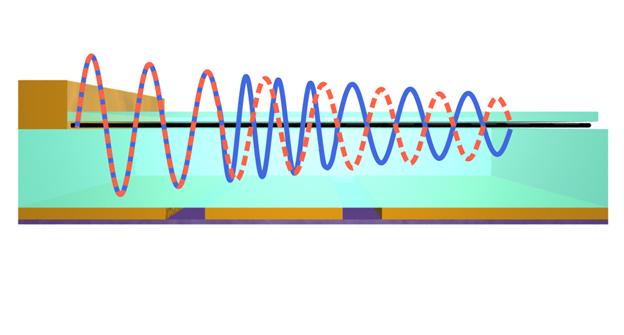

This is a phase modulation due to a local wavelength change.
Credit: Achim Woessner/ICFO
Modulating the amplitude and phase of light is a key ingredient for many of applications such as wavefront shaping, transformation optics, phased arrays, modulators and sensors. Performing this task with high efficiency and small footprint is a major challenge for the development of optoelectronic devices.
In a recent paper published in Nature Photonics, ICFO researchers Dr. Achim Woessner and Dr. Mark Lundeberg, led by ICREA Prof. at ICFO Frank Koppens, in collaboration with Prof. Rainer Hillenbrand from CIC Nanogune, Iacopo Torre and Prof. Marco Polini from IIT and Dr. Yuanda Gao and Prof. James Hone from Columbia University, have developed a phase modulator based on graphene capable of tuning the light phase between 0 and 2π in situ.
To achieve this, they exploited the unique wavelength tunability of graphene plasmons, light coupled to electrons in graphene. In their experiment, they used ultra-high quality graphene and build a fully functional phase modulator with a device footprint of only 350 nm, which is 30 times than the wavelength of the infrared light used for this experiment. A near-field microscope was used to excite and image the plasmons, allowing an unprecedented insight into the plasmon properties such as their wavelength and phase.
This new type of phase modulator enables graphene plasmons to be used for ultra-compact light modulators and phase arrays with the possibility to control, steer and focus light in situ. This has potential applications for on-chip biosensing and two dimensional transformation optics.
###
This research has been partially supported by the European Research Council, the European Graphene Flagship, the Government of Catalonia, Fundació Cellex and the Severo Ochoa Excellence program of the Government of Spain.
Link to the paper: http://www.
Link to graphene at ICFO: http://graphene.
Link to the research group led by ICREA Prof. at ICFO Frank Koppens: http://icfo.















